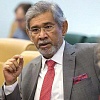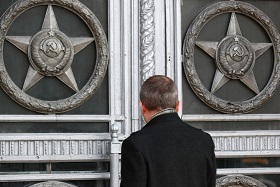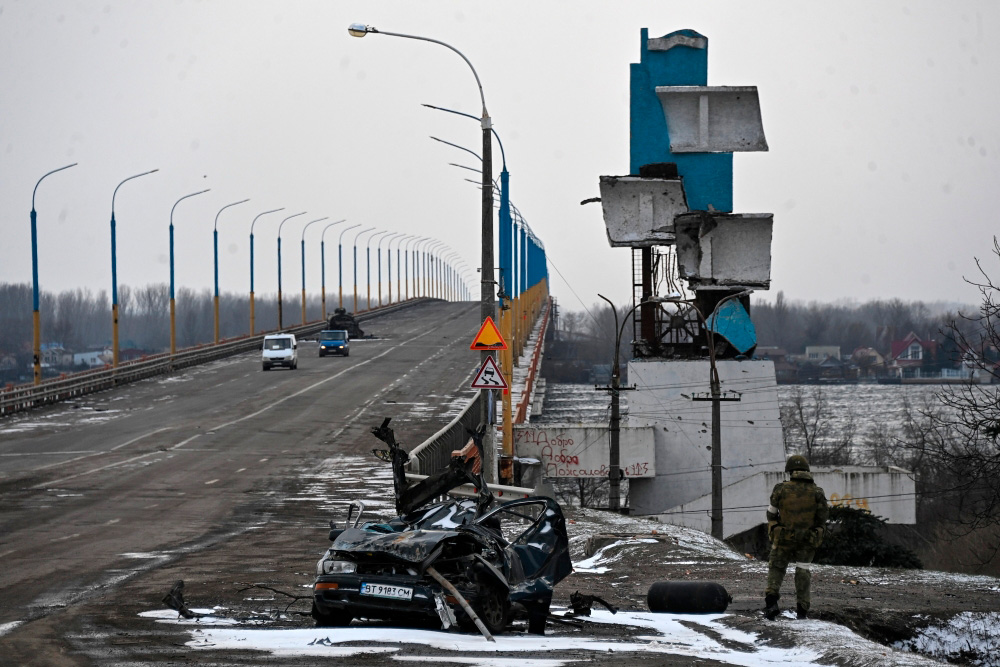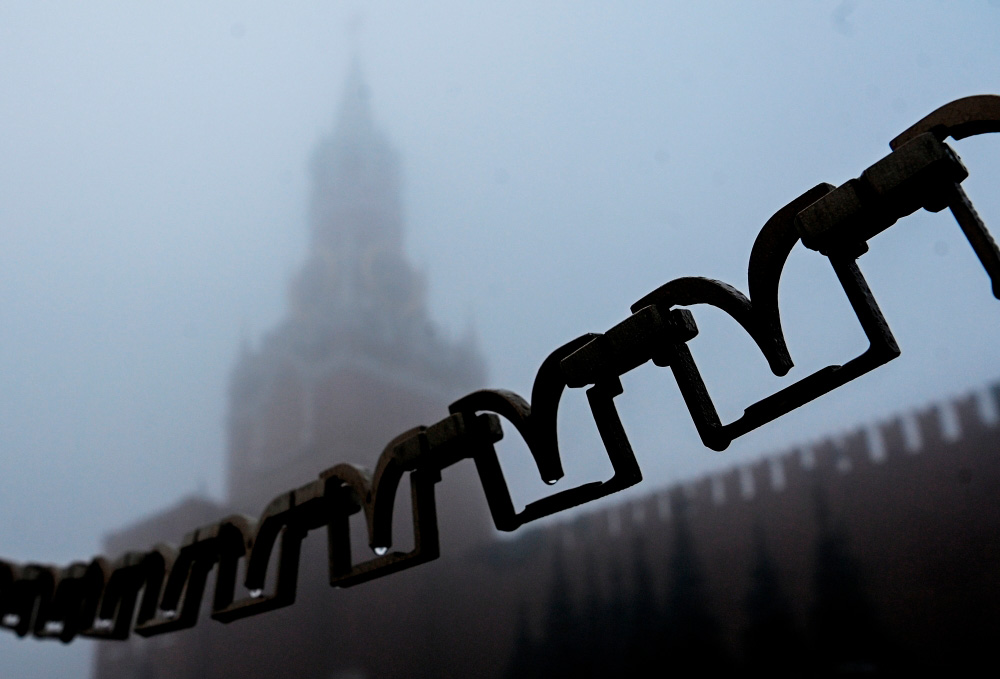For the West, Russia’s actions in Ukraine have revealed and confirmed the true face of Russia and its leadership. For much of the global East and South, the West’s policy from the mid-1990s right up to its gross overreaction to the situation in Ukraine was a reminder and revelation of the true character and intentions of the West.
If Russia emerges weakened from the Ukraine conflict, the West will emerge with not only an offensive strategic posture in the European theatre but also vis-à-vis Eurasia. It will move uninterruptedly to tighten the encirclement of China and sharpen its weapons, military and financial for the eventual confrontation.
Official documentation, discourse and actual moves of the West make its adversarial view of and intentions towards China clear. What is taking place now is only a misleading pause in Western hostility.
The weaponization of finances, economics and the global institutions in the West’s response to Russia’s action in the Ukraine, shredding and burning the long decades of a relationship with Russia in all domains at a moment’s notice, reveals not merely the ruthlessness the West is capable of, but also its instantaneous ‘bloc behavior’, its irrationality and zero-sum mentality. All these features can and may be brought to bear on China.
Though, in one respect it makes sense for China to buy time by tightrope-walking and juggling at the same time over Ukraine, the time that will be bought may work to China’s disadvantage if Russia, which guards China’s western flank as China guards Russia’s eastern flank, is weakened as a state. At the end of the period of time bought, China will be weaker to the extent that Russia may be weaker while the West may be stronger.
The West’s target is the capacity and the will of Russia to resist unipolar hegemonism. The West’s aim in Ukraine, taken together with its economic strangulation of Russia, is to prevail to such a decisive extent that Russia returns to the 1990s. To put it bluntly, Russia becomes a much larger Ukraine. If the West’s aims vis-a-vis Russia succeed and a compliant regime as in the 1990s replaces the current leadership, China will find that Russia no longer protects its western flank and may not even play the role of a buffer.
For the West, Russia’s actions in Ukraine have revealed and confirmed the true face of Russia and its leadership. For much of the global East and South, the West’s policy from the mid-1990s right up to its gross overreaction to the situation in Ukraine was a reminder and revelation of the true character and intentions of the West.
On the face of it, the Western bloc spearheaded by the U.S. is trying its best to secure a Chinese condemnation of Russia or to leverage China to push Russia into a ceasefire at a time unfavorable to it, or at the least, to prevent China from sanctions-busting and assisting Russia in any manner whatsoever. But is that the real aim and extent of U.S.-UK moves in relation to China?
Given the aggressiveness of the US-led West’s reaction to Russia on Ukraine, one may surmise that the West is seeking to seize the opportunity to confront Russia and China at a moment in history when it still retains the dwindling advantage.
The West’s contemporary China policy is a flexible pivot and a grand strategic offensive. It pivoted to Asia, bult up the Indo-Pacific strategy; it is now pivoting to the West, aimed at Russia, and it will, whether or not it prevails, pivot back to contain China.
If the West does not prevail in Ukraine, it will pivot back to containment of China; but if it does prevail in its aims towards Russia, when it pivots back to China, it will be from a position of strength, and adopting a policy beyond containment—it will be one of confrontation.
Instead of fighting a two-front campaign, the West seeks to neutralize the Eastern or Indo-Pacific front aimed at China, while it deals with Russia, and then to wheel around and focus on China.
For the present, the West hopes to de-link China from Russia, not so much strategically but tactically, but if it is obtained, that tactical advantage would enable it to prevail over Russia strategically in the Ukraine theatre and over both Russia and China—the Eurasian core states—grand strategically: globally and historically.
For the West, the battle for Ukraine has become the battle for Russia. The battle for Russia is only the first phase of the battle against China. It is not a mere battle—it is a war for the re-establishment of Western global hegemony. It is not a war of the worlds but a war for the world. Or if it is a war of the worlds, it is Westworld versus Eastworld.
If Russia emerges weakened from the Ukraine conflict, the West will emerge with not only an offensive strategic posture in the European theatre but also vis-à-vis Eurasia. It will move uninterruptedly to tighten the encirclement of China and sharpen its weapons, military and financial for the eventual confrontation.
Crudely put, if Russia is weakened by the Ukraine outcome, the knock-on effect will be to weaken the position of China as well. The grand strategic matrix, in which the Chinese state is embedded, will be significantly altered in favor of the West.
Official documentation, discourse and actual moves of the West make its adversarial view of and intentions towards China clear. What is taking place now is only a misleading pause in Western hostility.
The weaponization of finances, economics and the global institutions in the West’s response to Russia’s action in the Ukraine, shredding and burning the long decades of a relationship with Russia in all domains at a moment’s notice, reveals not merely the ruthlessness the West is capable of, but also its instantaneous ‘bloc behavior’, its irrationality and zero-sum mentality. All these features can and may be brought to bear on China.
The Chinese stake in the U.S. and Western economy can be taken hostage just as Russia’s was, with the much larger effect on the Western economy outstripped by the hyper-McCarthyism that is so evident in the case of Russia. In the case of China, there could be greater Western irrationality and viciousness because of subconscious racism.
Though, in one respect it makes sense for China to buy time by tightrope-walking and juggling at the same time over Ukraine, the time that will be bought may work to China’s disadvantage if Russia, which guards China’s western flank as China guards Russia’s eastern flank, is weakened as a state. At the end of the period of time bought, China will be weaker to the extent that Russia may be weaker while the West may be stronger.
The West’s target is the capacity and the will of Russia to resist unipolar hegemonism. The West’s aim in Ukraine, taken together with its economic strangulation of Russia, is to prevail to such a decisive extent that Russia returns to the 1990s. To put it bluntly, Russia becomes a much larger Ukraine. If the West’s aims vis-a-vis Russia succeed and a compliant regime as in the 1990s replaces the current leadership, China will find that Russia no longer protects its western flank and may not even play the role of a buffer.
Ukraine’s President Zelensky says that Ukraine is fighting for Europe. Similarly, whether it knows it or not, Russia, in resisting NATO’s expansionism in Ukraine, is fighting for the whole of Eurasia and indeed the world, outside of the West. This includes Latin America, which has for the most part, recently voted against Russia at the UN.
None of this means that China should interfere or will “intervene” on the side of Russia in Ukraine, as it did when the U.S. troops, disguised as UN troops, were moving towards the Yalu River in Korea, thereby threatening China itself. That was a direct threat, and Mao Zedong argued that China should intervene even though it had just emerged triumphant after the anti-Japanese war and the prolonged Civil war. Mao’s son, a fighter pilot, died in the Korean War.
That was a threat on China’s border, and it reacted accordingly, much as Russia is doing now in Ukraine. This does not mean that China should ever consider intervening in the same manner. However, the Western power-projection in the Ukraine conflict does pose a threat, albeit indirect, to China’s interests and—over the medium and long term—to China as such. This means that a strictly hands-off policy of neutrality may not make the most sense.
What would make sense? It is not up to us to be prescriptive, but two markers in the history of China’s external policies stand out. Let’s start with the latter, because it was more episodic than doctrinal, though it flowed from a global strategic perspective. That example is Hungary 1956. Mao Zedong and the Communist Party of China was opposed to the line taken at the 20th Congress of the Communist Party of the Soviet Union (CPSU) and especially the denunciation of Stalin in Nikita Khrushchev’s ‘secret speech’. However, when the CIA supported the uprising that broke out in Hungary, Mao urged Khrushchev to intervene because passivity risked a loss to the Socialist camp as a whole. If one removes the ‘socialist’ tag, this means the loss to the shared geostrategic interests at the time of both Russia and China.
The initial cause for the Sino-Soviet schism with its tragic consequences for global equilibrium was that, in the Chinese perception, the post-Stalin leadership in Moscow was not standing up to the West. By contrast, when Stalin died in 1953, Mao’s commemorative essay was titled ‘The Greatest Friendship’.
In the current Russian leadership, China has a partner who is and has been standing up to the West. If that resoluteness has an entirely negative outcome, Russia’s will to resist may decline to the point it did in the 1990s, the West would have prevailed and would be poised to prevail globally over all peer competitors and perceived rivals.
It is the partnership of Russia and China that prevents each power from being isolated by its common adversary.
The more important marker is the pronouncement Mao made in the late 1940s on the eve of victory. The Cold War had commenced. The Communist Party of China, especially Zhou Enlai and Mao, had established a good relationship with ‘Vinegar’ Joe Stillwell and the U.S. mission sent to assist Mao’s forces in the anti-Japanese war. Meanwhile in 1948, Yugoslavia’s Marshal Tito had broken with Moscow to adopt a line: independent, if not softer, towards the West than towards the Soviet Union. In that context, when Mao could have done the same thing, he chose not to do so. (Of course, he was to do worse later, but not when Stalin was alive and resisting the West). Instead, he rolled out the argument as to why China should and would tilt to (the Soviet) Russia. Mao summed up this perspective as “Leaning to One Side”.
The relevant essay of Mao, titled On the People’s Democratic Dictatorship was issued on the occasion of the 28th anniversary of the founding of the Communist Party of China, several months before the victory of the Chinese revolution on October 1, 1949. Of great contemporary interest and relevance is the following extract from that landmark text:
“…‘You are leaning to one side.’ Exactly. The forty years’ experience of Sun Yat-sen and the twenty-eight years' experience of the Communist Party have taught us to lean to one side, and we are firmly convinced that in order to win victory and consolidate it we must lean to one side. In the light of the experiences accumulated in these forty years and these twenty-eight years, all Chinese without exception must lean either to the side of imperialism or to the side of socialism. Sitting on the fence will not do, nor is there a third road. We oppose the Chiang Kai-shek reactionaries who lean to the side of imperialism, and we also oppose the illusions about a third road.
…We must not show the slightest timidity before a wild beast. We must learn from Wu Sung on the Chingyang Ridge. As Wu Sung saw it, the tiger on Chingyang Ridge was a man-eater, whether irritated or not. Either kill the tiger or be eaten by him -- one or the other.”
At the meeting of Communist and Workers parties in Moscow in 1957, Mao declared that the global balance of forces was moving against the West. Typically poetic, he said that “the East Wind Is Prevailing Over the West Wind”.
Today, if NATO achieves its aims of “defeating Russia”, the West wind will surely prevail over the East Wind, or more prosaically, the West will be poised to prevail over the East.
Given the high stakes involved today, will China continue to strive for an intermediate posture and balance or will it “lean to one side” as Mao urged in 1949?







